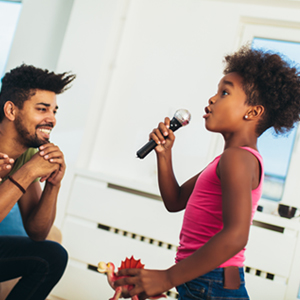Music lovers everywhere surely celebrated when news came out that music was
great for children’s academic development. The discovery of what is known
as the Mozart Effect sent parents scrambling for music lessons as they
discovered the influence of music and the possibility that music could
improve their children’s intelligence. In 1998, the governor of Georgia
even began a program distributing classical music to each infant born in
the state.
We’ve come a long way since the 1990s in understanding how music can
benefit all individuals, not just children. For example, music is being
used as therapy to help victims of strokes recover. Researchers in Finland
found that not only did stroke victims’ verbal memory increase with music,
but their mood also improved. Music has also been credited with lowering
blood pressure and reducing anxiety. The National Sleep Foundation
recommends music as a side-effect-free alternative to sleep aids, and music
was even used therapeutically to help shooting victim and member of the
U.S. House of Representatives Gabrielle Giffords.
“There are many ways that developmentally appropriate music impacts a young
child’s learning, no matter what area of development is considered –
cognitive, language, social, physical or spiritual. Each of these domains
can be positively influenced by the presence of music in a young child’s
life,” says Ellen Allard, a multi-award-winning children’s composer, who
has been watching children interact with her music since 1976.
How can parents incorporate more music into their children’s lives? Here
are just a few ideas:
- Wake up to music instead of an alarm. This can be accomplished with
a clock radio or apps. - Take music breaks during homework time. After a set amount of time
working, let kids take a break to listen to a song or two before
getting back to work. - Incorporate music into your daily routine, such as singing the
“Brush Your Teeth” song as your children brush their teeth. - Add songs to liven up boring parts of your day. Sing songs while
doing chores, waiting in line or stuck in traffic. - Take advantage of free music concerts available to the public,
which can often be found at public parks. - Are the kids banging on pots and pans? Join in and extend their
learning with different rhythms and songs. - Play music in the background at home or in the car. You can use
travel time to teach children about the music you love. - Create new lyrics to favorite tunes. Encourage children to make up
their own songs. - Have a dance party at home!
- Teach children to use music to help regulate their own emotions.
For example, maybe there is a certain song they would like to
listen to when they feel sad, one that helps them to feel better. - Make instruments together. Whether it’s a coffee can drum or a
rubber band and cardboard box, there are plenty of items around the
house that can have musical uses! - Make your own music video. Record your children singing their
favorite song. Grandma and Grandpa would love to see the results! - Look for music online. The internet offers many opportunities to
learn more about music.
- Take music lessons! There are many studios that offer first-rate
voice lessons or teach your child how to play a variety of
instruments. Check out Washington Parent’s Arts Guide
(washingtonparent.com/guides/gd-arts.php) for local options.
Of course, if you have the opportunity for your child to participate in
music lessons, all the better. But if you can’t make the time or financial
commitment, there are still plenty of ways to nurture your child’s love of
music!


